|
The focus of the Leveson Inquiry turns to Paul Dacre, Ian Edmondson and Max Clifford.
Leveson Inquiry: Paul Dacre - live,
06 February 2012
|
Leveson Inquiry: Paul Dacre - live Guardian News Blog
By Josh Halliday and Dugald Baird
Monday 6 February 2012
- Extract -
2.27pm: Paul Dacre, editor-in-chief
of the Daily Mail, has taken the stand.
2.30pm: Dacre is the longest-serving
editor on Fleet Street and chairman of the PCC editors' code of conduct committee. He has been editor of the Daily Mail
since 1992 and editor-in-chief of Associated Newspapers since 1998.
(...)
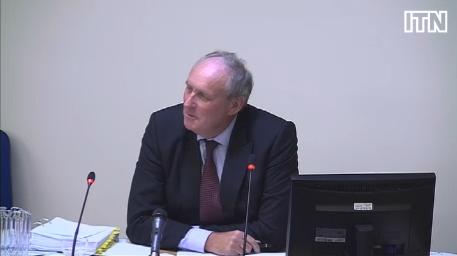
|
| Leveson inquiry: Paul Dacre |
4.25pm: Jay asks
Dacre about the Daily Mail's coverage of the disappearance of Madeleine McCann.
Dacre is asked if the Daily
Mail refused to publish an apology because supportive articles outnumbered the harmful ones. Dacre says he does not know.
Jonathan Caplan QC, counsel for Associated Newspapers, intervenes to say that the legal settlement was agreed between
the McCanns and the publisher.
4.26pm: Dacre says that the McCanns
complaining to the PCC would have "nipped things in the bud" earlier.
"The Mail's reporting
of the McCan story was much more responsible that most papers. I can't say any more than that," he adds.
Newspapers felt they had the "green light" to write what they liked about the McCanns after the couple employed
a public relations adviser, Dacre says.
The McCann story was one of the few examples of a story that boosted sales,
says Dacre. He says, with hindsight, he is glad the Mail didn't splash on it too much.
-------------
Transcript
The Leveson Inquiry
06 February 2012
- Extract 1 -
21
MR JAY: Let us assume, Mr Dacre, that licensing of
22
journalists may well be unattractive to virtually
23
everybody, including this Inquiry. So how, in
24
a nutshell, in your view, do you lock papers into
25
self-regulation?
25
1 A. Right, we've discussed the civil -- the contract, which
2 I think is attractive and should be explored and it
3 needs to convince Lord Justice Leveson that it would
4 work and it would be robust and have teeth. I'm
turning
5 this a little bit backwards, but I think
someone else
6 has proposed this arbitration arm to
the new system, the
7 new tri-part system of arbitration.
I welcome that. If
8 cheap and quick justices
can be -- or decisions can be
9 established in this
way and in privacy and defamation
10 cases, clearly
everybody, but particularly the newspaper
11 industry,
would benefit, because you know we're reeling
12
from the extraordinary costs involved in no win no fee
13
cases.
14 I must say, I welcome
it, but I have my doubts.
15 I wonder whether it's
going to be as cheap as you think
16 it is. I
don't know how such a set-up, such a structure
17
would deal with a Mosley. I cannot believe it's not
18
going to need some kind of secretariat. I cannot
19
believe that when big, big players, very wealthy
20
players, come along, they're not going to bring along
21
expensive silks and then the industry is going to have
22
to supply its lawyers, but nevertheless --
23 LORD JUSTICE LEVESON: Well,
it could be inquisitorial
24 rather than --
25 A. Yes, I accept that, but I still think it would involve
26
1 cost and I guess how much cost the industry
would
2 bear -- can bear, because of the parlous state
of it --
3 I genuinely don't know. But look,
it's a very welcome,
4 very positive, very constructive
suggestion.
5 My worry is how
much it will lock Desmonds into it.
6 By and large,
Mr Desmond -- and this is not Punch and
7 Judy show
-- he doesn't produce the kind of
8 journalism
-- with the exception of the McCanns, it's
9 more
celebrity bland journalism -- that would end up in
10
this court, in this court of arbitration. So I'm not
11
sure how much of an inducement it would be to him --
12 LORD JUSTICE LEVESON:
It depends whether there was a costs
13 regime associated
with going to the law which made it
14 more attractive
to go down an arbitral route.
15 A. What I'm trying to suggest --
I don't think, with the
16 exception of the McCanns,
his papers are involved in
17 cases that do go to law.
They don't produce, by and
18 large, that kind
of journalism. OK magazine is very
19 bland,
slightly sycophantic journalism. (continues)
(...)
- Extract 2 -
6
Q. Can I move on to the McCanns, which is another example
7
this Inquiry's been looking at. Both Doctors McCann
8
complained of defamation against both the Evening
9
Standard, which was then under the Associated titles,
10
and the Daily Mail; is that correct, Mr Dacre?
11 A. Yes.
12
Q. The Evening Standard made a donation to the Madeleine
13
fund and published an apology. Dr Gerry McCann's
14
evidence was that whereas the Daily Mail agreed to carry
15
a number of free adverts or appeals for information on
16
behalf of the campaign in their continental edition,
17
they were not willing to publish an apology because the
18
good stories, as it were, outweighed the bad stories.
19
Is his evidence correct or not?
20 A. I don't know. It was
a confidential agreement, as you
21 know.
22 Q. Well, he's given evidence -- it was paragraph 80 of his
23
witness statement -- which made that specific point. Is
24
it something you feel you can deal with or not?
25 A. Sorry, what was
the specific point?
77
1 Q. That the Daily Mail refused to publish an apology
2 because the supportive articles balanced out the
3 pejorative articles. That was the thrust of his
4 evidence.
5
A. I honestly don't know. This was dealt with by the legal
6
department. I mean, we're in no position to refuse. If
7
he felt he had the right to an apology, presumably he
8
could have insisted on it. I just don't know.
9 Q. Weren't
you involved at all in this case, given its
10 prominence
and importance?
11 A. I had have known the broad brushstroke decision-making
12 but not the detail. I'm the editor-in-chief
of a huge
13 newspaper company.
14
Q. But didn't you think it right, in the circumstances, to
15
offer the McCanns an apology or not?
16 A. I think the Mail's reporting
of the McCann story was
17 much more responsible than
most papers. I can't say
18 more than that.
Sorry.
19 MR CAPLAN: Can I just interrupt: my understanding is that
20 the settlement with the McCanns was an agreed settlement
21 between themselves and Associated Newspapers.
22 LORD JUSTICE LEVESON: Thank you.
23
MR JAY: You gave evidence to a Select Committee along the
24
lines -- I think this is a direct quote -- that you were
25
disappointed the McCanns did not complain to the PCC.
78
1 Do you recall that evidence?
2
A. I'm not sure whether the word "disappointed" is correct.
3
I certainly think it was a pity. As you know, the PCC,
4
I think, contacted the British embassy 48 hours after
5
the terrible tragedy --
6 Q. Yes, we recall all that evidence.
7 A. Okay. It would have nipped things in the bud much
8
earlier, I suspect, if the McCanns had lodged a specific
9
complaint about stories they felt were unacceptably
10
inaccurate. This -- you know, this was one of the most
11
awful tragic stories.
12 Q. But under the existing PCC regime, that would
have
13 precluded legal action, wouldn't it, a
complaint to the
14 PCC?
15
A. No, it doesn't preclude it, but you can't take legal
16
action at the same time as complaining to the PCC.
17
Obviously later you can take legal action. The PCC
18
won't take a complaint, I believe, if a legal action has
19
already been launched.
20 LORD JUSTICE LEVESON: Is there a justification
for that or
21 do you think that's something that
ought to be looked
22 at?
23
A. I think the feeling is the one could prejudice the
24
other.
25 LORD JUSTICE LEVESON: It happens to doctors, solicitors,
79
1 everybody else, that a disciplinary body
will go
2 alongside civil proceedings.
3
A. I'm not aware of that, but I think it would be very
4
unfair to both parties if they were going on at the same
5
time. As I say, I would have thought it was
6
prejudicial.
7 MR JAY: Of course, a complaint to the PCC might well have
8 involved a complaint against the Daily Mail. What
would
9 the Daily Mail have done in the face of such
10 a complaint?
11
A. Well, obviously we'd have looked into it, we'd have made
12
our defence and if we'd have been adjudicated against,
13
would have carried the court's -- but I repeat:
14
I think -- I mean, this was the most extraordinary
15
story. There have only been two or three in my
16
lifetime. You could actually see, when you got the
17
circulation reports of other newspapers that week,
18
people putting the McCanns on the front pages, their
19
circulations went up. I remember the rows and
20
recrimination in our offices that we weren't carrying
21
these stories. Well, in retrospect, I'm glad we didn't
22
carry those stories.
23 But
you have to bear in mind it was the Spanish
24 police
who named this family --
25 Q. The Portuguese police.
80
1 A. I do apologise, the Portuguese police. The family
2 appointed their own public relations expert, and I think
3 this was seen by some papers as giving the green light
4 that anything that kept this in the public domain and
5 increased the possibility that the girl would be spotted
6 would be helpful. I think that was a terrible
mistake.
7 Q. You disassociate the Daily Mail, I suppose, from these
8 other newspapers?
9
A. No, I think looking back there was obviously the odd
10
article that we regretted. I think -- but I think, on
11
a balanced view of the Daily Mail's performance on that
12
story over the years, I think we were at the more
13
responsible end.
14 Q. Or, perhaps uncharitably turning around, less
15 irresponsible than other newspapers; is that fair or
16 not?
17
A. No.
18 LORD JUSTICE LEVESON: It's interesting. That's
the third
19 example we've just looked at -- Gately,
Jefferies,
20 McCanns -- where there has been, as it
were, a snowball
21 effect. It is an interesting
aspect of these very
22 difficult, very high profile
stories.
23 A. Yes. Gately was only over a few days, I think.
24 LORD JUSTICE LEVESON: Oh yes.
25
A. And Jefferies was only over a few days. This was a --
81
1 what? One-year, two-year story?
2 MR JAY: That's right. It's only right, Mr Dacre, that
3 having mentioned three stories where some might say
the
4 Daily Mail is worthy of criticism, there's
a story which
5 I'm sure you would say is rather
different, namely the
6 Stephen Lawrence story. (continues)
|
Leveson Inquiry: Ian Edmondson - live,
09 February 2012
|
Leveson Inquiry: Ian Edmondson - live Guardian News Blog
Posted by Lisa O'Carroll and Dugald Baird
Thursday 9 February 2012
- Extract -
10.44am: Ian Edmondson
has now taken the stand.
Edmondson was the former head of news at the News of the World. He became head of news
in November 2005 and left in 2011.
He is being questioned by the counsel to the inquiry, Robert Jay QC.
(...)
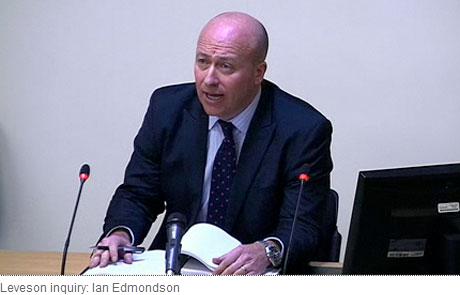
11.16am: Jay asks
about the News of the World's publication of Kate McCann's diary without her permission.
Edmondson says
he was instructed by Myler to record a call with the McCanns' press adviser at the time, Clarence Mitchell, regarding
the diary. He adds that recording such calls was standard practice.
He says that, on the instruction of Myler,
he did not make it clear in the call that the paper had a copy of the diary.
He says he was uncomfortable about
this, as he was friends with Mitchell. "I liked Mitchell a lot. I felt uneasy, but I did what I was told."
11.18am: Edmondson says he was told to "not make it clear what we had,
tell him in general terms, something woolly".
He adds: "... to give
him the impression we were running a story, but not tell him what story, certainy not tell him we were in possesion of the
complete diaries. There had been publication of extracts of the diaries in Portugal but not to the extent we had; he was frightened
he [Mitchell] would take action." 11.20am: Edmondson
agrees with Jay that the thinking behind this was to prevent the story being injuncted.
He told Myler, who had
Gerry McCann's telephone number, that they could have worked "collaboratively" with the McCanns but Myler said
this wouldn't work.
11.22am: Edmondson says the paper deceived
the McCanns.
"I can't remember an occasion of this ilk," he adds. "I'm sure there were occasions
when an editor would want you to effectively deceive someone, yes."
Asked by Jay if there were other occasions
an editor would want to deceive someone, but this was a particularly egregious example, he replies: "I think so, yes."
11.24am: The Guardian's head of media and technology, Dan Sabbagh,
has just tweeted:
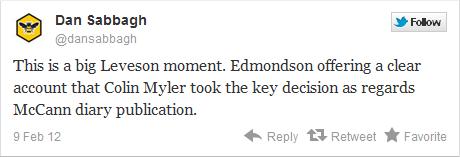
(...)
11.34am: Leveson
asks Edmondson some more questions about the Kate McCann diary. Did he or did not make it clear to Clarence Mitchell that
he had the entire diary? "No," says Edmondson.
11.34am: Edmondson
has now completed his testimony and the inquiry is taking a short break.
(...)
1.23pm:
We now have a transcript of Ian Edmondson's claim that he was told by News of the World editor Colin Myler
not to tell Kate McCann's PR adviser that the paper had her diaries: Jay: The McCann
diary story. May I start by reminding us all of Mr Myler's version – or rather, his evidence, pardon me. Tab 8,
page 89. This is part of the transcript of his evidence given on 14 December last year. Particularly at line 20, I think,
but we can skim read a little bit earlier on but can I just try and get to the heart of this. The question was: "But
did Mr Edmondson make it clear to you that he had made it clear to Mr Mitchell that he had the whole diary and was going to
cause extracts from it to be published in the News of the World?
Edmondson: That's what he led me to believe,
yes.
Jay: Because reading the transcript, and this is something which you didn't, of course, see at the time,
the transcript of the conversation "... And then we identified the transcript."
Edmondson: Mm-hm.
Jay: Or maybe it's not necessary to go on, because we're then trying to interpret the transcript, about which
you give clear evidence. But the gist of it is, the bit I read out between lines 20 and 24. Can I seek to deal with your evidence
carefully in this way: first of all, you make it clear that your only conversation with Mr Mitchell was on Friday, 12 September
2008; is that right?
Edmondson: That is right.
Jay: Recalling the conversation, what is your evidence
in relation to that. I think you say it's standard practice?
Edmondson: Yes, it was.
Jay: Were you
given an instruction to do so on this occasion?
Edmondson: I was, yes.
Jay: By?
Edmondson:
Colin Myler.
Jay: Do you know why you were given that instruction?
Edmondson: Reinforcing please tape
it – and it was standard practice to tape those types of phone calls and I might even say that to a reporter but I would
reinforce it.
Jay: But was it standard practice to make it clear to your interlocutor that the call was being recorded?
Edmondson: No.
Jay: And why not?
Edmondson: You wouldn't get, in general terms, a true conversation.
Jay: Because?
Edmondson: They would play to the camera.
Jay: Do you feel that it's entirely
a frank and honest procedure to conduct an interview with someone but not make it clear that it's being recorded?
Edmondson: Yes, I do.
Jay: Because?
Edmondson: Accuracy.
Jay: Obviously it gives you concrete
evidence (overspeaking) subject to experting what's being said, one understands that, but is there not an element of deception
– or maybe I can put is slightly lower than that, because that, I think, is a slightly sort of sinister tone, but at
least an element of misleading the person you're speaking to that you are recording them and therefore it might be used
to (overspeaking)?
Edmondson: I think that's fair.
Jay: But your feeling is, well, if you did make
it clear that it was being recorded, then they would do what?
Edmondson: I would imagine freeze up, not talk to
you freely, not talk to you honestly. They might not want to talk to you at all. A number of things.
Jay: I can
see that they might not want to talk to you at all, but you think if we did make it clear to them that this he were being
taped, there would be more incentive to be dishonest during the course (overspeaking)?
Edmondson: I would say that's
fair, yes.
Jay: Had there been occasions when you've had conversations with people which haven't been recorded?
Edmondson: I'm sure there has been, but certainly not on a call that is paramount to a story, and something that
might be used later on as evidence.
Jay: The third question which was put to you in a written notice, which we
see at the bottom of page 60272, the question was this: "During the during the course of that conversation (conversation
with Mr Mitchell] did you make it clear to Mr Mitchell that the News of the World had obtained a copy of Dr Kate McCann's
personal diary from a source who had ... (reading to the words)... intended to write a story based on that diary quoting verbatim
from it? If so, please identify with reference to the transcript of your conference where you made it clear." And then
your answer, please, Mr Edmondson?
Edmondson: I didn't make it clear.
Jay: And you say because you
were given express instructions by Mr Myler?
Edmondson: Correct.
Jay: When did he give you those instructions?
Can you recall?
Edmondson: From memory, at a meeting on Thursday of that week.
Jay: Why did he give
you those instructions?
Edmondson: I attended a meeting with Mr Myler and Tom Crone where we discussed this story.
I think we got the story to a point where I was prepared to present it to Tom and Colin, the editor. Colin gave – sorry,
I beg your pardon – Tom gave his legal view, which I'm told I'm not allowed to repeat, but which dismayed, shall
I say, Mr Myler. So he decided to ask me to make a call to Mr Mitchell, not make it clear what we had, telling him in general
terms, basically make it very woolly. I think someone previously used the word "ambiguous" – that is absolutely
spot on what he wanted.
Jay: So the preferred outcome for the end point of the conversation with Mr Mitchell would
be what?
Edmondson: To give him the expression that we were running a story, but not tell him specifically what
story, certainly don't tell him that we were in possession of the complete diaries, as we understood. There had been extracts
in the diaries – of the diaries in Portuguese papers which had been translated into the English papers, but certainly
not to the sent that we had. He was frightened that if Clarence knew what we had, he might take action.
Jay: Well,
he would do – was the fear that he would, at the very least, tell his clients, the McCanns, what was going on?
Edmondson: Correct.
Jay: ...and they would certainly get back to Mr Myler by phone.
Edmondson: Correct.
Jay: Or make an application for an injunction to stop the News of the World publishing? Is that what it amount to?
Edmondson: That's exactly what it would.
Jay: What was the purpose, though, of having an ambiguous
or woolly conversation, as you've described? What was the you intention? That you would have Mr Mitchell's part assent?
Could you put it in your own words?
Edmondson: Yeah, it would be in order to blame Clarence Mitchell that he hadn't
acted properly upon instructions.
Jay: I see. And was that part of Mr Myler's thinking?
Edmondson:
That was his thinking.
Jay: Was it Mr Crone's thinking?
Edmondson: No.
Jay: So you presumably
were uneasy in carrying out these instructions?
Edmondson: Yes. I had an alternative, which I presented to Mr Myler.
He was the only one to have Gerry McCann's mobile number, and up until that point, he had a reasonable or very good relationship
with him, and I thought he could argue that we could work collaboratively to get the diaries in the paper, and that was my
suggestion.
Jay: And what was Mr Myler's reaction to that suggestion?
Edmondson: No.
Jay:
Because?
Edmondson: I think he believed, from memory, and I can't be sure, that that wouldn't be a successful
outcome.
Jay: I understand. So you were sent out to make it call and presumably in the light of the evidence you're
giving to us, you felt uneasy by what you were being asked to do?
Edmondson: Yeah, I'd developed a very good
relationship with Clarence and I liked him a lot. I felt very uneasy.
Jay: Why did you do it then?
Edmondson:
I was told to.
Jay: Do you feel that this was a sort of one-off, because we're looking at this one example,
or do you feel it's part of a general sort of system or culture or practice, however you want to put it, and this is just
one exemptfication of that?
Edmondson: I must admit I can't remember an occasion of this ill be. I'm sure
there was occasions where an editor both want you to effectively deceive someone, yes.
Jay: So there were other
occasions of deception, to use your word, but this was a particularly egregious (overspeaking)?
Edmondson: I think
it is, yes.
-------------------
Transcript The Leveson Inquiry
09 February 2012
[Official
transcript not yet online]
-------------------------
Witness Statement The Leveson Inquiry
4. In relation to the McCann diary story (14/09/08):-
(i) To the
best of your recollection, did you have any relevant conversation with Mr Clarence Mitchell in any occasion other than on
Friday 12th September 2008? If so, give the date or dates of such conversation, the gist of what was said, and provide any
transcripts of the same.
In relation to the McCann diary stories, I did not have any other conversation
with Mr Mitchell other than the conversation on Friday 12th September.
(ii) Why did you record the conversation
with Mr Mitchell on 12th September 2008?
I was told to record this conversation by Colin Myler. It was
standard practice to record conversations which might need to be relied on subsequently.
(iii) During the
course of that conversation, did you make it clear to Mr Mitchell that the News of the World had obtained a copy of Dr K McCann's
personal diary from a source who had obtained it from the Portuguese Police, and that the paper intended to write a story
based on that diary quoting verbatim from it? lf so, please identify with reference to the transcript of your conversation
where you made it clear.
I did not make this clear, on express instructions from Colin Myler
I had been working on the presentation of this story for some days. Mr Myler was aware that we were obtaining the diaries.
I had excerpted parts of diary which demonstrated that the McCanns were not involved in the disappearance of their daughter.
This was the angle which we were interested in promoting. I believe that we had removed parts of the diary which were unnecessary
to demonstrate their innocence, and were merely private or personal entries.
Prior to telephoning Clarence Mitchell,
I was called to a meeting with Colin Myler and Tom Crone to discuss the possibility of running this story and the possible
consequences. I recall Tom Crone advising Mr Myler, but understand that I cannot reveal the content of that advice as it is
legally privileged, I believe I can say that Mr Myler did not seem particularly happy at the advice he was given.
I recall suggesting to Mr Myler that, given his access to Dr G McCann (he was the only one to have his mobile telephone
number), that he telephone Dr G McCann and talk it through with him. Mr Myler disagreed with that suggestion. He decided to
run the story. He told me to have a conversation with Mr Mitchell in which I should refer to us running a story about Dr K
McCann's diary but in which I should not make the full position clear. He told me to make it plain that we had some sort
of access to the diaries, and that we might run a story, but that I should not make it clear that the intention was to quote
verbatim from it.
I was conscious that Mr Myler had good relations with Mr and Mrs McCann and Mr Mitchell and that
he could easily have made this telephone call himself if he had wanted to. But, instead, he told me to do it. It seemed to
me that this was to keep him one step removed from the situation so that he was better placed to deal with any fallout (as,
in the event, he did, by apologising for the story).
I recall thinking at the time that this was not fair to Mr
Mitchell or Mr and Mrs McCann. However, I felt powerless as I had been categorically told what to do by the editor and from
my experience of working for Mr Myler, I did not believe that challenging him or disobeying him would achieve anything other
than negative consequences for me.
I am aware that this is not the account given by Mr Myler. I would point out
to the Inquiry first, if I was really acting contrary to my editor's instructions that I would not have recorded the phone
call to Mr Mitchell and provided a transcript of it to Mr Myler a couple of days after publication, and second, if I had lied
to the editor and the lawyer and that had been the cause of the distress to Mr and Mrs McCann, and an apology was then published
in the News of the World to Mr and Mrs McCann, and also money was then paid out by the News of the World to Mr and Mrs McCann
- had I lied to my editor in that way and with such consequences, I would have been instantly dismissed. This did not happen.
(iv) Did Mr Mitchell agree to the publication of such a story on that basis? If so, please identify with reference
to the transcript of your conversation where he gave that agreement.
I refer to my answer immediately
above.
-----------------------
PDF Downloads:
|

|
Witness Statement of Ian Edmondson (pdf, 280K)
click here to download file
|
|
|
Leveson inquiry: Ian Edmondson contradicts
Colin Myler evidence, 09 February 2012
|
Leveson inquiry: Ian Edmondson contradicts Colin Myler evidence
The Guardian
Former News of the World news editor gives different version of events surrounding the publishing of Kate McCann's
diaries
Dan Sabbagh
Thursday 9 February 2012 13.08 GMT
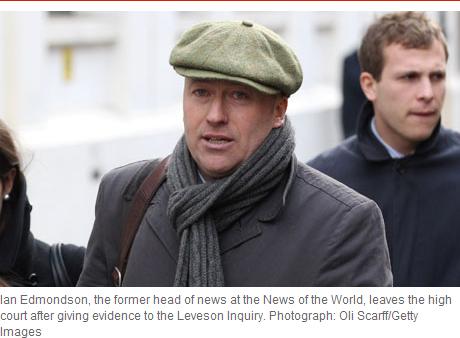
The former news editor of the News of the World has contradicted
evidence given to the Leveson inquiry by his one time editor Colin Myler over what a spokesman for the McCanns was told about
the planned publication of Kate McCann's diary by the now closed Sunday tabloid in 2008.
Ian Edmondson, giving
evidence to the inquiry on Thursday, said he was instructed by Myler to call Clarence Mitchell, the McCanns public relations
representative, and tell him only in "very woolly" terms that the newspaper would be running a story about them
without giving the family any indication that the tabloid was going to publish her diaries in full.
The editor's
instruction, Edmondson said, was to give Mitchell the impression "that we were running a story, but not tell him specifically
what story" and that "certainly don't tell him [Mitchell] that we were in possession of the complete diaries".
Myler, Edmondson added, was "frightened that if Clarence knew what we had, he might take action".
Robert
Jay QC, counsel to the inquiry, asked Edmondson what was the purpose of "having an ambiguous or woolly conversation?"
Edmondson replied that the purpose would be "in order to blame Clarence Mitchell that he hadn't acted properly upon
instructions" if there was a row post-publication.
Edmondson's appearance before Lord Justice Leveson
was the first time he has spoken publicly since he was arrested and bailed on suspicion of phone hacking in April of last
year. The former News of the World news editor was not asked any questions about hacking because of the ongoing police inquiry.
Edmondson's evidence directly contradicts that given by Myler to the Leveson inquiry on 14 December. Myler was
asked: "Did Mr Edmondson make it clear to you that he had made it clear to Mr Mitchell that he had the whole diary and
was going to cause extracts from it to be published in the News of the World?"
In response, Myler said: "That's
what he led me to believe, yes."
Kate McCann told the Leveson inquiry in November that she felt "mentally
raped" by the News of the World's decision to publish her diaries in full – diaries that she had written after
her daughter Madeleine had disappeared on holiday in Portugal in 2007, and which were subsquently seized by the Portuguese
police. The diaries were translated into Portuguese and acquired by the News of the World, which retranslated them to publish
them.
A week later, the News of the World printed an apology for publishing the diaries, and it subsequently emerged
that the Murdoch-owned title paid £125,000 to the fund for finding Madeleine.
Edmondson told the inquiry
on Thursday that Myler's instruction to ring Mitchell came after a meeting that he, Myler and the News of the World's
former legal manager Tom Crone had ahead of publication. Edmondson said that Crone gave "his legal view, which I'm
told I'm not allowed to repeat, but which dismayed, shall I say, Mr Myler". The News of the World editor then asked
Edmondson to call Mitchell.
Myler lost his job as News of the World editor upon the title's closure last July
in the wake of mounting phone hacking revelations.
In January it was announced that he was to become the editor
of the New York Daily News, the bitter rival of Rupert Murdoch's New York Daily Post.
|
|
Leveson Inquiry: McCann family 'not told
about diary publication', 09 February 2012
|
Leveson Inquiry: McCann family 'not told about diary
publication' The Telegraph
The News of the the World's former head of news Ian Edmonson contradicts evidence given by his former editor Colin
Myler at the Leveson Inquiry.
2:46PM GMT 09 Feb 2012
Ian Edmondson told the Leveson Inquiry that former editor Colin Myler told him to deliberately mislead the McCanns'
spokesman about the newspaper's plans to publish Kate McCann's diary.
Mrs McCann has told the inquiry she
felt "violated" and like "climbing into a hole and not coming out" when the intensely private journal
appeared in the now-defunct paper on September 14 2008.
Mr Myler has said he would never have published the diary
- which was obtained from a female Portuguese journalist - if he had realised she was not aware of what the paper was planning
to do.
He said Mr Edmondson told him he had cleared the story with the family's spokesman, Clarence Mitchell.
|
Leveson Inquiry: News of the World editor
'ordered deception of McCanns', 09 February 2012
|
Leveson Inquiry: News of the World editor 'ordered
deception of McCanns' The Telegraph
Colin Myler, the editor of the News of the World, ordered his news editor, Ian Edmonson, to mislead a spokesman for
Madeleine McCann's parents about an intrusive story the tabloid planned to publish, it was claimed at the Leveson inquiry.
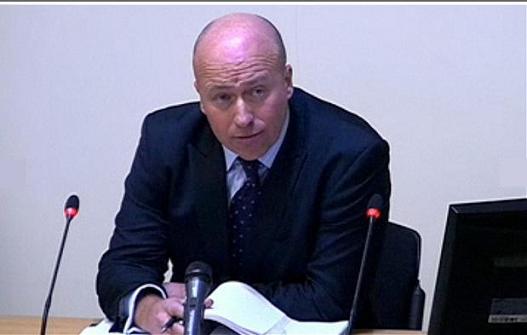
Ian Edmondson told the Leveson Inquiry that former
editor Colin Myler told him to deliberately mislead the McCanns' spokesman about the newspaper's plans to publish
Kate McCann's diary
By Martin Beckford, Home Affairs Editor
3:43PM
GMT 09 Feb 2012
Mr Myler was said to have told Mr Edmonson to have a "woolly" conversation with
Clarence Mitchell and not reveal the fact that the newspaper was going to print Kate McCann's private diary.
He came up with the ploy to stop the family of the missing girl obtaining an injunction against the story being published,
the Leveson Inquiry into press standards heard on Thursday.
The evidence from Mr Edmonson, the former head of news
at the News of the World who is taking his old paper to an employment tribunal, contradicts what Mr Myler has previously said.
The former editor has told the Leveson hearing that his paper would never have published the diary of the missing
girl's mother if she had not been aware of the plan, and that he thought Mr Edmonson had cleared it with the McCanns'
spokesman, Mr Mitchell.
Giving evidence at the Royal Courts of Justice hearing, Mr Edmonson said he had a meeting
with Tom Crone, the paper's senior lawyer, who gave a view of the story that "dismayed" his editor.
He said the editor told him to phone Mr Mitchell but not to make it clear exactly what the paper had and intended to publish
that Sunday - "make it very woolly".
This was in case the McCanns "took action" to stop the
story coming out, and also as cover in case they complained afterwards.
"It would be in order to blame Clarence,
that he hadn't acted properly on instruction."
Mr Edmonson said he felt uneasy about doing this and suggested
that the editor ring Gerry McCann himself, but was overruled.
Asked by Lord Justice Leveson if he had told his
editor that he had informed the McCanns' spokesman about the planned diary story, Mr Edmonson replied: "No."
Although there was a "sea change" in the culture at the tabloid after the original phone-hacking trial and
the Max Mosley case, Mr Edmonson said bullying still went on.
"Everything emanates from the editor,"
he told the hearing.
"It's not a democracy, the newspaper, it's autocratic," he concluded.
Mr Edmonson also denied he had told the reporter Neville Thurlbeck what to write to the women seen in a notorious
sex video with Max Mosley.
"I wasn't in the habit of drafting or dictating emails."
He
said he "didn't like the tone" of the messages telling them they could remain anonymous if they cooperated with
the paper, otherwise they would face exposure.
"I think they're a threat."
He said the
"majority" of stories in which they used the private investigator Derek Webb to carry out surveillance were about
love affairs, and that some were in the public interest.
"There have been a number of examples of false public
image - someone portrays themselves in the media as wholesome, faithful and would never cheat on their wife but they're
doing something else in private."
He said politicians would highlight their "family values" in election
literature while celebrities would "parade their children" in glossy magazines.
Mr Edmonson insisted
the private investigator Mr Webb had been carrying out journalistic work and was simply better at following people than reporters,
but admitted "it was a sham" to make him join the National Union of Journalists.
He said important phone
calls would be taped but that he would not tell the person on the end of the line that they were being recorded, lest they
stopped talking.
|
|
Clarence Mitchell speaks out following Leveson
Inquiry, 10 February 2012
|
Clarence Mitchell speaks out following Leveson Inquiry PRWeek
Matt Cartmell
Friday, 10 February 2012, 9:37am
Clarence Mitchell
has told PRWeek that he 'takes some comfort' from yesterday's Leveson Inquiry, where there were revelations about
the News of the World printing extracts from Kate McCann's diary.
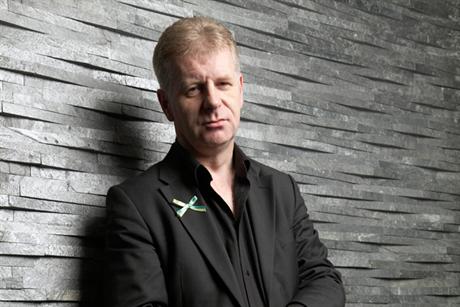
Former News of the World news editor Ian Edmondson revealed yesterday
that former editor Colin Myler ordered that Mitchell should be told only in 'very woolly' terms that the newspaper
would be running a story about the McCanns, without giving any indication of a plan to publish the diary in full.
Mitchell, who works as PR representative for the McCanns, told PRWeek: 'What Edmondson said entirely supported my version
of the events, and while its true we did discuss a possibility of a piece going into the paper, I was left with the distinct
impression it would be a minor piece, and that it would be entirely supportive.
'It should never have happened.
I take some comfort that Edmondson has supported my version of events. It was a fairly insalubrious episode.'
Mitchell, who is Burson-Marsteller's MD, added that he did not rule out being called up to speak in the inquiry in the
future.
Elsewhere in the inquiry, Max Clifford dubbed phone-hacking a 'cancer that now hopefully has been cut
out'.
Following his appearance, Clifford told PRWeek: 'The British public is starting to be aware of the
excesses of the media over the past ten years. If nothing else comes out of it, we hope we will have a free press in a democracy.
'I hope we have an effective press complaints authority that will take care of ordinary members of the public,
who at the moment have no-one to protect them.'
Speaking after the inquiry, PRCA chief executive Francis Ingham
said that one of the themes to emerge was 'how central PR professionals are to many, if not most, of the stories those
newspapers carry'.
'Given I am clear that our industry performs a predominantly beneficial role in society,
the more it is understood, the better,' added Ingham.
W Communications founder Warren Johnson added: 'The
appearances of Max Clifford and Clarence Mitchell before the Leveson inquiry have highlighted the surprisingly low turn out
from the rest of the PR industry.
'The recent Independent story on Bell Pottinger has certainly served to spark
wider public interest in the influence that parts of the PR industry do, or allege to, wield. My wider concern, though, is
that the inquiry may further erode trust in and credibility of the press, which in turn could negatively affect the role of
PR in the eyes of clients and consumers alike.'
|
Leveson Inquiry: Max Clifford - live,
09 February 2012
|
Leveson Inquiry: Max Clifford - live Guardian News Blog
Posted by Lisa O'Carroll and Dugald Baird
Thursday 9 February 2012
- Extract -
2.52pm: PR veteran Max
Clifford has taken the stand.
(...)
3.05pm: Clifford
says he believes editors are now frightened – partly because of the Leveson inquiry, partly because of the public backlash
following the Dowlers' and McCanns' testimony at the inquiry.
"That sent shockwaves throughout Fleet
Street, particularly tabloids," he says. "[I have heard people] wouldn't run with something because of the Leveson
inquiry."
However, he says the change in newsroom culture post-hacking, post-Dowler is "a good thing".
(...)
3.22pm: Clifford also represented Robert Murat, who
sued over stories libelling him in relation to the disappearance of Madeleine McCann.
Clifford says Murat was "bordering
on suicide" and he was happy to help.
Murat won £600,000 from four newspapers in 2008 in relation to
the coverage.
He said the PCC was useless in relation to Murat.
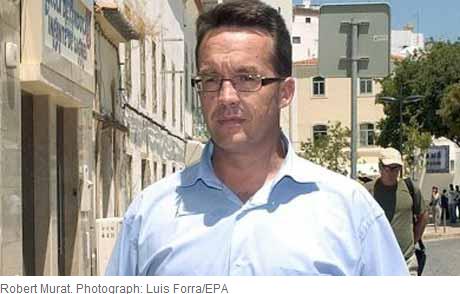
--------------------
Transcript The Leveson Inquiry
09 February
2012
[Not yet online]
-----------------
|
|
|
|
|
|
With thanks
to Nigel at
McCann Files
|
|
 |
|
|
|
|









